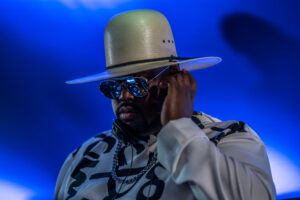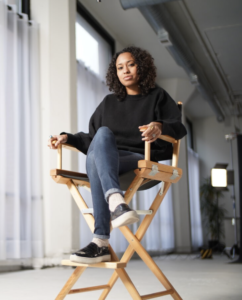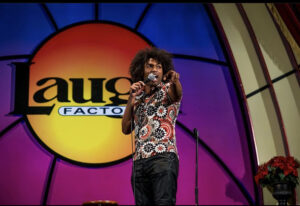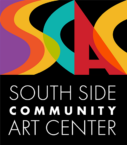SSCAC CELEBRATES JUNETEENTH WITH MUSIC, POETRY, COMEDY, AND FAMILY ART MAKING ACTIVATIONS – FREE AND OPEN TO THE PUBLIC!
FAMILY ART MAKING ACTIVITIES
12 – 2PM
*POLAROID PHOTO ACTIVATION
*CYANOTYPE ACTIVATION
*LIMITED EDITION TOTE BAG LAUNCH FEATURING THE WORK OF ARTIST BRANDON BREAUX
*PRINT WORKS BY ARTIST ERIC VON HAYNES
*PHOTO ACTIVATION WITH ARTIST CATALYST CECIL MCDONALD JR.
WE’RE THRILLED TO HOST DJ DUANE POWELL, POET RESITA COX, ARTIST CATALYST CECIL MCDONALD JR. AND COMEDIANS MAX THOMAS & ARLIETA HALL!
1:30 – 4PM

Duane Powell’s love for music started an early age growing up in the 1970’s being exposed to Chicago’s rich soul music scene. He has spun at and has had residencies at many of the most popular venues around Chicago including the House Of Blues, Virgin Hotel, The Promontory and Reggie’s Music Club. In addition, he has opened for many heavyweights in soul music including opening for Frankie Beverly & Maze at The Taste Of Chicago and has shared the bill with many legendary DJ’s and Grammy-winning producers in the dance music world including Joe Claussell, DJ Spinna, Steve “Silk” Hurley, Maurice Joshua, Josh Milan, Timmy Regisford, Ron Trent and more.
As a promoter, he launched the SOUNDROTATION brand in 1999, further cultivating the underground soul scene in Chicago giving many of those acts their performance debuts in the market.

Resita Cox’s films are a poetic portrayal of her community’s irrepressible spirit and resilience in the face of racism. Her documentary film work is people based, meaning it not only features unique, personal stories, but it also prioritizes relationships and is constantly working to reimagine an equitable filmmaking model. Born and raised in the South, her films center Southern, Black communities and use them as a lens to examine topics ranging from environmental justice to racial justice – all themes she also explores through her poetry and performance.
With a degree in journalism from The University of North Carolina at Chapel Hill, Resita started her career as a storyteller in TV news as a reporter in North Carolina and later in Chicago. Resita has worked with Kartemquin Films as the Impact Producer on their Emmy-nominated docu-series produced with The Marshall Project, We Are Witnesses.
She is the director of Freedom Hill, a documentary about the environmental racism that is washing away the first town chartered by Black people in the nation, with which she was named a 2021 Hulu/Kartemquin Accelerator Fellow. She holds an MFA from Northwestern University in Documentary Film and is a 2021 Sister’s in Cinema Documentary Fellow. Resita was also recently named a North Star fellow with esteemed documentary organization, Points North Institute.

Max Thomas was raised on the Southside of Chicago. He grew up on Jimi Hendrix, Bernie Mac, & Soy Milk. Max has been featured at Zanies, The Comedy Store, The NBC Break Out Comedy Festival 2017-2019, Jokes and Notes, The Second City Chicago & Hollywood, Laugh Factory, Steppenwolf Theater, Black & Funny Festival, Chicago Shakespeare Theater, Detroit Improv Festival, Boston Improv Festival, Out of Bounds Festival Austin, TX, The Hideout Chicago & Boston, The Revival Theater, Keenan Thompson: The Ultimate Comedy Experience and Lollapalooza Music Festival.
His acting credits include Chicago P.D. (NBC), Broke Down Drone (Film), Hot Date (Netflix), Studio B (Web Series), Code-Switched (Web Series) and Othello (CST). His performance training is from The Second City Chicago, The School at Steppenwolf & The British American Drama Academy(BADA).

Arlieta Hall is a host, actress, improviser, stand up comedian, and first time filmmaker from Chicago. She is a 2021 Second City NBC Bob Curry Fellow who recently co-starred as Sadie on Showtimes’ The CHI episodic.
Arlieta is also a caregiver for her father who is a person with Alzheimer’s and takes the power of “Yes, and…” to communicate with him and using their story to make her first film “Finding Your Laughter” Catch Arlieta Hall while you can performing all around the city, zoom, and get a sneak peek of her upcoming documentary

I am most interested in the intersections of masculinity, familial relations, and the artistic and intellectual pursuits of black culture, particular as this culture intersects with and informs the larger culture. Through photography, video, and dance/performance, I seek to investigate and question the norms and customs that govern our understanding of each other, our families, and the myriad of societal struggles and triumphs. I studied fashion, house music and dance club culture before receiving a MFA in Photography at Columbia College Chicago, where I currently serve as an adjunct professor and a teaching artist at the Center for Community Arts Partnership at Columbia College Chicago.
My work has been exhibited both nationally and internationally, with works in the permanent collection of The Cleveland Museum of Art, Chicago Bank of America LaSalle Collection, and Museum of Contemporary Photography. I was awarded the: Joyce Foundation Midwest Voices & Visions Award, the Artadia Award, The Swiss Benevolent Society, Lucerne, Switzerland Residency and the 3Arts Teaching Artist Award. I participated in Light Work’s Artist-in-Residence program in July 2013. In 2016 the first edition of my monograph In The Company of Black was published and was shortlisted by the Aperture Foundation for the 2017 First PhotoBook Award.



